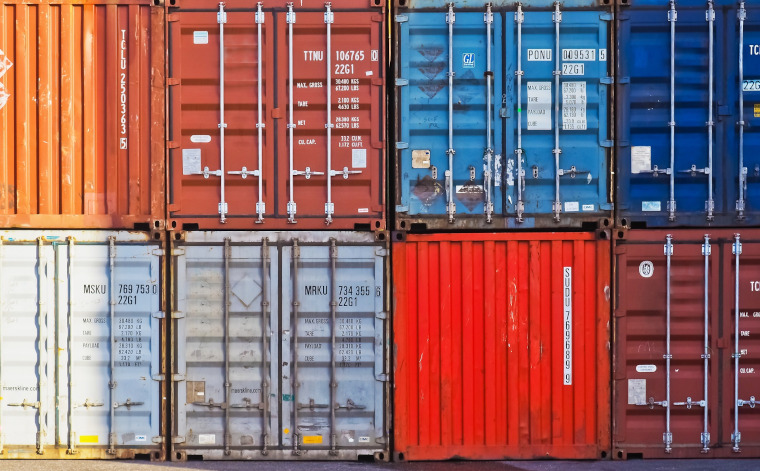Bruno Ramljak is co-founder of Dubee Agency specialists in customs clearance for interior designers. I bumped into Bruno at Decorex and he offered to write a ten point guide to customs regulations since Brexit
Bruno says, “My first visit to Decorex this year opened my eyes to the beauty of the interior design industry. I was impressed by the people who lead this field with their love and passion for their work.
But I also realised that interior designers have to deal with many difficulties in international trade and customs, especially after Brexit. This is especially true for smaller companies, as they often lack a logistics and customs specialist. That’s why I decided to write this brief guide with some basic customs knowledge based on the topics covered at the show. Hopefully this will help interior designers save time and money.
What changed after Brexit from a logistics point of view? Customs clearance is now required for all goods moving between the UK and EU and every consignment needs to have two customs declarations: one for exporting from the EU and one for importing into the UK. For example, if you buy a sofa from the EU, the seller has to fill in an export declaration in their country and you have to fill in an import declaration in the UK.
Is the EU treated like any other (third) country when dealing with the UK? When you look at the customs clearance side of things – yes, it is. However, the UK and EU have a trade deal (known as TCA) that makes things easier for importers and exporters. It allows goods that originate in the UK or EU to be traded without any customs duty, as long as they meet certain rules of origin. This means you can save money and avoid extra paperwork when importing goods from the EU or export goods to the EU.
Does that mean that goods brought in from the EU are not subject to customs duty? It depends on where the goods are manufactured. This is also called the origin of the goods.
If the goods are made in the EU, they are considered to have EU origin and are duty-free.
On the other hand, if the goods are made in a non-EU country, such as China, they are of non-EU origin and in some cases subject to customs duty. The origin of the goods does not change even if they are moved or stored in different locations.
For example, if you buy a product that is made in China and shipped from Germany, the product still has Chinese origin and you have to pay customs duty on it. On the other hand, if you buy a product that is made in Germany and shipped from China, the product still has German origin and you do not have to pay customs duty on it.
How do I know if a product is subject to customs duty? The customs duty rate for a product depends on two things: its country of origin and its commodity code. The country of origin is where the product is manufactured and the commodity code is a 10-digit number that identifies the product category and subcategory.
To check the customs duty rate for a product, you can use the UK Trade Tariff tool. This tool will show you the applicable duty rate, as well as any other measures that may apply. However, these measures may vary depending on the type of the goods, so it’s best to consult with your customs agent to ensure you have the correct information.
What about import VAT – do I have to pay it? Import VAT is paid when you import goods from outside the UK. A VAT registered business can avoid paying import VAT by using the Postponed VAT Accounting (PVA) scheme.
You can use PVA automatically if you are a VAT registered business, without applying for it.
If you use PVA, your accountant will have to account for your import VAT on your VAT returns.
You or your accountant just need to keep track of your import VAT and report it to HMRC on your VAT returns. You can do this by using the online service Postponed import VAT statement, which will show you how much import VAT you need to account for.
Who will clear customs for my goods? The customs clearance process for your imported goods may vary depending on the type, size, and shipping method of your items.
For instance, if you are importing a small item and your supplier chooses to ship it by air via a Fast Parcel Operator (DHL, UPS) they will take care of the customs clearance for you. For larger items, your supplier may have a specific customs agent that they work with. Or they might let you choose your own customs agent.
DAP, DDP, EXW – what are these? Those are the three most commonly used Incoterms. Incoterms are international trade terms that define the responsibilities and risks of buyers and sellers in cross-border transactions. They specify who pays for transportation, insurance and customs clearance, and who bears the risk of loss or damage during the transit. Below is a brief explanation.
DAP (Delivered At Place) – The seller arranges and pays for transportation, insurance, and export customs clearance, the buyer arranges the import customs clearance. The buyer bears the risk of loss or damage from the point of delivery.
DDP (Delivered Duty Paid) – The seller arranges everything up to your door (including transportation, insurance, export and import customs clearance). The buyer bears the risk of loss or damage from the point of delivery. This is usually the most expensive option for buyers as sellers tend to charge a premium for handling all the aspects of shipment.
EXW (Ex Works) – The buyer arranges transportation, insurance, and export and import customs clearance. The buyer bears the risk of loss or damage from the point of pickup. This is usually the cheapest but the riskiest option for buyers, as sellers transfer all risks at pickup.
Each of these Incoterms has its advantages and disadvantages, depending on which side of the supply chain you are on (buyer or seller).
If you have the option to choose the incoterms with your suppliers, I suggest you go for DAP. This way, the seller will handle the export clearance in their country and the delivery to the specified location (your warehouse). Your only responsibility will be to arrange the import clearance in the UK. It’s cheaper than DDP and less risky than EXW, and you still have control over arranging the import clearance.
How has Brexit affected the import costs from the EU? The transport costs have increased, but this is not necessarily related to Brexit. Transport costs depend on many things such as fuel prices, exchange rates, demand and supply, etc.
There is a customs clearance fee now. However, you do not have to pay VAT (you can use postponed VAT accounting) or customs duty (if the goods are of EU origin) when importing.
The value of goods also influences whether it is worth importing from abroad or buying locally.
For example, if the value of goods is low, it might not be worth importing from abroad because the customs clearance costs will make it too expensive. On the other hand, if the value of goods is high, the customs clearance costs will not have a significant impact on the final price of the product.
What is the cost of a customs agent? The costs vary greatly depending on the company providing the services. You can expect to pay anywhere from £35 and £250. Newer companies that grew after Brexit and were able to focus on technology can offer lower prices than traditional companies who offer a wider range of services.
Is there anything else I need to know in terms of customs? When you import goods from abroad, you become an importer in the eyes of HMRC. This means you have to follow the HMRC rules and keep your customs records for at least six years. HMRC can check your customs records anytime and ask you to explain or justify your transactions.”
Dubee Agency are specialists in customs clearance for interior designers of furniture and homeware. Their customers include interior designers, furniture retailers and EU suppliers.




A good concise explanation of importing, specially since Brexit.
To grow companies have no choice but to embrace Brexit, helpful clear advise from Bruno .
Simple use of PVA helps cash flow .
Dubee Agency offer all importers ease of use and a personal service at a cost effective service .
Compliance is included free of charge with all records held securely for every Importer and backed up by HMRC at your CDS account.
All this at a cost effective fee.
Thanks Bruno.